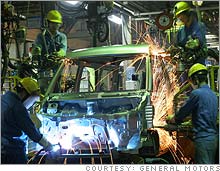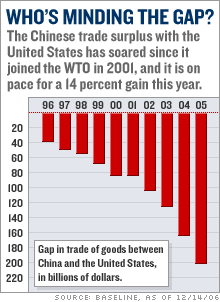China's trade buddy: Corporate AmericaThose pushing for changes in U.S.-China trade and currency policy are getting little help from the major U.S. companies now doing business there.NEW YORK (CNNMoney.com) -- U.S. officials left China Friday with little to show after a two-day trade summit. And that's probably just fine with some of the big U.S. companies like General Motors and Caterpillar that already do business there. It's not surprising that retailers such as Wal-Mart (Charts) wouldn't be particularly interested in seeing the Chinese yuan gain in value against the dollar - something U.S. officials have said repeatedly they'd like to see - since that would make the goods the world's biggest retailers buys from China more expensive.
But many manufacturers such as GM (Charts) and Caterpillar (Charts) haven't been pushing for changes in the yuan or rules restricting who can own plants or how they can sell goods in the world's most populous nation. In a speech last spring in Beijing, Caterpillar CEO Jim Owens attacked legislation proposed by Senators Charles Schumer, D-N.Y. and Lindsey Graham, R-S.C., that would have slapped tariffs on Chinese imports if Beijing didn't move to boost the value of its currency, the yuan, which most economists say is undervalued against the dollar. "While many of our differences are serious, I'm calling on U.S. policymakers to pursue a different path - to focus more on 'carrots' than on trying to find bigger 'sticks',." he said in the speech. "It is time to curb the rhetoric and focus more on engagement. We know that unilateral sanctions rarely work - and in this case would be completely counterproductive." Many U.S. businesses without operations in China are desperate for changes in the yuan exchange rate and Chinese trade rules. They agree with U.S. officials who say that the artificially depressed yuan gives Chinese exporters an unfair advantage. The U.S. Business & Industry Council, for example, which represents small and mid-size U.S. manufacturers, attacked the results of this week's U.S. trade mission to Beijing, calling it "chit-chat diplomacy" and a "complete sham." But the National Association of Manufacturers, the trade group whose members include the large multinationals doing business in China, as well as smaller U.S. manufacturers, was more active than any other trade group pushing against the Schumer-Graham proposal. "We can't let these trade problems lead to retaliation and counter-retaliation that could do irreparable harm to the entire trading system and the enormous gains it has brought the American companies, workers and consumers over the years," said a letter that NAM President John Engler sent to senators in opposition to the bill. Does a cheap yuan help GM? University of Maryland Professor Peter Morici, a strong critic of U.S. trade policy with China, charges that companies like GM and Caterpillar are among those most responsible for the lack of U.S. progress in changing trade policies with China. "They give lip service to a revaluation, but they don't want the federal government to do anything that would cause it to happen," he said. "They're encouraging their suppliers to move to China to take advantage of the undervalued currency. If the yuan increases in value, they'll lose that advantage." Morici said that protections that are in place in China for Chinese manufactures also help U.S. companies that have joint venture plants there, such as General Motors, which has seen its partnerships there take a lead position in auto sales in China. He said that's one of the reasons GM's China operations are among its most profitable. "Once you've established plants in a protected economy, you don't want the protections come down," said Morici. GM spokesman Greg Martin said that if the yuan was revalued higher, it would provide a "windfall" to GM by raising the revenue it receives from car sales there. But he said that GM has more pressing currency concerns than the value of the yuan - notably the value of the Japanese yen. "We've been very forthright and said the overvaluation of the dollar (against many currencies) hurts American competitiveness," he said. "The reason we've focused on the yen is it disproportionately affects us because of the large number of Japanese vehicles imported into the U.S. market." A cheaper yen makes Japanese exports more competitive in the United States. As to why GM hasn't pushed to have the Chinese auto market be as open as the U.S. market and whether GM benefits from the restrictions now in place there, Martin said, "We broadly support open markets but I'm not going to single out any one country." Jim Dugan, spokesman for Caterpillar in China, denies that the market there is protected by Chinese rules and regulations. "This is a highly competitive market," he said. "All of the major international competitors we have, they're here competing in this market as we are. In addition there are numerous domestics competitors seeking the same business." Caterpillar has 13 facilities in China, about half of which are joint ventures with Chinese partners and the rest which are wholly-owned. Afraid of Chinese retaliation Frank Vargo, the vice president for international economic affairs for NAM , said that even if it's in a company's interest to change trade rules in China, many feel it's not a good idea to be the one pushing for a change. "There certainly is a feeling among companies, not just on currency, but on bringing WTO cases and intellectual property protections, that you don't want to be the guy complaining," said Vargo. "The Chinese still have a lot of control over the economy. It's like the old line about doing business in the old Soviet Union - the nail that sticks out gets hammered." Vargo couldn't site an example of a company that saw its chances in China hurt by its push for changes, but he added, "I've heard enough from companies to believe this is not just their imagination," GM's Martin and Caterpillar's Dugan denied their companies are worried about being punished by the Chinese, but they said good relations with foreign governments is important to their business. "Our position is rather than taking an adversarial approach on areas where we may have disagreement, we should try engagement," said Dugan. "Yes, the Chinese market is important to us. And having good relations with China is important. I don't know if that's unique to China," said Martin. But Morici said that fears of angering the Chinese government have stopped the major U.S. companies from pushing U.S. officials harder on improving access to China and a revaluation of the yuan. "Whenever proposals are floated in Washington, they're not for Americans having any leverage," he said. "A businessman who is making money does not like to disrupt the status quo. If they start making noise the Chinese doesn't like, they can be punished very rapidly." |
|



